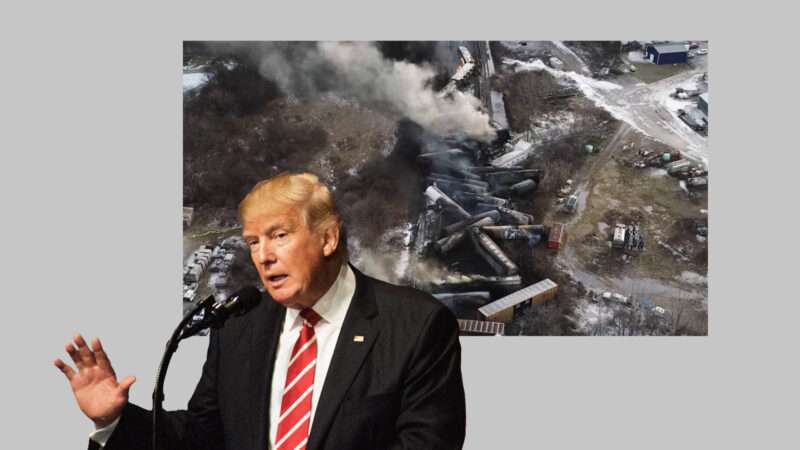
Under the watch of then–President Donald Trump in May 2019, the Department of Transportation withdrew a proposed regulation that would have required all freight trains in the United States to operate with two-person crews.
That rule, which the Federal Railroad Administration (FRA) had been contemplating since the waning days of the Obama administration, was backed by labor unions as a way to protect railroading jobs from automation that allows trains to operate safely with only a single person in control. After three years of investigating the issue, the FRA reported that accident data did not show two-person crews to be any safer than one-person crews. The National Transportation Safety Board (NTSB) agreed, telling the FRA that "There is insufficient data to demonstrate that accidents are avoided by having a second qualified person in the cab."
Then, in February, a train derailed in East Palestine, Ohio. It spilled vinyl chloride, a chemical long used to make PVC plastics, into a trackside ditch, and a controlled burn used to clean up the mess launched towering plumes of black smoke over the town.
In the media and political frenzy that followed, there has been little opportunity for a sober discussion about railroad safety. Instead, a bipartisan group including Ohio Sens. Sherrod Brown, a Democrat, and J.D. Vance, a Republican, have rushed forward with the Railway Safety Act, a bill that would impose the two-person crew requirement that the FRA considered and rejected in 2019.
The rule still has nothing to do with safety. Indeed, the train that derailed in East Palestine had a crew of three aboard.
Rather than being focused on policies that will actually improve the safety of American railroads, the bill—which could get a final vote this week—is all about politics. As such, it is a useful illustration of how right-wing populists like Vance are actually advancing long-running goals of the political left in their muddled pursuit of reorienting the Republican Party.
That includes Trump, of course. Even though it was his administration that killed the two-man-crew mandate in 2019, the former president is now a strong supporter of the bill that would impose the same mandate in 2023.
"JD Vance has been working hard in the Senate to make sure nothing like this EVER happens again, and that's why it's so important for Congress to pass his Railway Safety Act," Trump posted on Truth Social last month. "JD's terrific bill has my Complete and Total Endorsement."
Trump has never been one to think deeply about policy—or to let hypocrisy get in the way of political opportunism. Still, the fact that Trump, Vance, and seven other Republican senators have jumped to endorse a bill full of labor policies unrelated to railroad safety is telling. It's perhaps the clearest legislative signal yet of a political trend identified by Reason's Stephanie Slade, which she calls right-progressivism.
It's not the first time this has happened. Former Fox News host Tucker Carlson heaped praise on Sen. Elizabeth Warren (D–Mass.) in 2019 for a list of economic policies that Carlson said "sound like Donald Trump at his best." Sens. Marco Rubio (R–Fla.) and Josh Hawley (R–Mo.) sided with unionized rail workers during a recent labor spat with the Biden administration. Much of Trump's protectionist trade agenda might as well have been pulled directly from the progressive playbook.
As Slade notes, those on the political right who are advocating for a larger, more powerful federal government are often "unapologetic proponents of actual left-wing policies, such as tariffs, industrial subsidies, and aggressive antitrust action."
Add costly and unnecessary regulations to the pile.
The two-man-crew mandate is just the start. The Railway Safety Act also grants broad new powers to Transportation Secretary Pete Buttigieg, who would be responsible for creating a new regulatory regime to govern trackside sensors and the power to write new regulations for railcars and their routine inspections. Regulations that make it more difficult or expensive to ship goods by rail will actually undercut safety by pushing more hazardous materials onto roadways, warns Philip Rossetti, a senior fellow at the R Street Institute.
Rail accidents have been steadily declining for years, notes Michael Gorman, a business and logistics professor at Dayton University, in a recently published paper. Meanwhile, trucking accidents are on the rise, and trucking accidents involving hazardous materials have caused more property damage and loss of life than train derailments in recent decades. Legislation that exclusively piles new regulations onto rail will trigger "higher rail shipping costs and more goods traveling by truck, which would be a decidedly inferior outcome for society," Gorman concludes.
In supporting the Railway Safety Act, Vance and Trump are signaling support for a litany of left-wing goals: growing the regulatory state, giving bureaucrats more power over American businesses, and protectionism for union jobs. They're also falling into the same trap as many progressives: ignoring trade-offs and obvious unintended consequences.
If the so-called New Right is reorienting the conservative movement to help accomplish the goals of the progressive left, one might wonder why America has a conservative movement at all.
The post In Debate Over Railway Safety Bill, J.D. Vance and Donald Trump Are Leaning to the Left appeared first on Reason.com.







